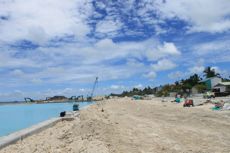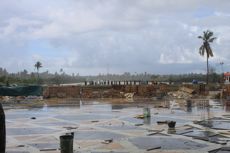With almost half the world’s seven billion people aged under 25, and 1.2 billion aged 10-19, investment and education in the young has never been more important.
That was one stand-out finding of the UN’s State of the World Population Report for 2011, unveiled in the Maldives today during a ceremony in the UN’s headquarters in Male’.
Rather than preach population reduction measures, the report acknowledges seven billion as testimony to the success of humanity, and advocates “planning and the right investments in people now – to empower them to make choices that are not only good for themselves but for our global commons.”
Space, a video promo by National Geographic for the report noted, was not the problem. Rather, it was a question of balance.
“Our world of seven billion can have thriving, sustainable cities, productive labour forces that can fuel economic growth, youth populations that contribute to the well-being of economies and societies, and a generation of older people who are healthy and actively engaged in the social and economic affairs of their communities,” noted Executive Director of the UNFPA, Babatunde Osotimehin, in the report’s introduction.
“People are living longer, healthier lives. But not everyone has benefited from his achievement or the higher quality of life that this implies. Great disparities exist between and within countries. Disparities in rights and opportunities also exist between men and women, girls and boys,” Osotimehin wrote. “Governments that are serious about eradicating poverty should also be serious about providing the services, supplies, information that women need to exercise their reproductive rights.”
Many of the issues to do with providing opportunities for youth outlined in the report have strong parallels in the Maldives, where a quarter of the population is aged between 15-24.
Speaking at the report’s launch in Male’, Vice President of the Maldives Dr Mohamed Waheed Hassan observed the migration of young people to Male’, and the need to create more job opportunities in the atolls.
Currently, a quarter of all young men and half of all young women in the atolls are unemployed. Anecdotally, many youth in Male’ are voluntarily unemployed.
Dr Waheed acknowledged the problem: “As important as access to jobs are better wages. People make calculations on whether it is worth working. If the pay is so low [they are unable to afford rent], they will stay at home and remain dependent on their parents,” he noted.
“It is also important to look at jobs not just in terms of salaries, but work satisfaction,” Dr Waheed said, noting that teachers in the Maldives frequently claimed this as their highest concern.
It was also important to ensure growing the number of jobs – an estimated 21,000 were needed each year – also included women, he added.
Deputy Minister of Finance Haifa Naeem suggested the Maldives needed to “diversify jobs to attract the youth market, in fields such as arts and culture.”
“Social investments in youth people’s education, health and employment can enable countries to beuild a storng economic base, thereby reveersing intergenerational poverty. Enhancing young people’s capacties can yield larger returns during the course of their economically productive lives,” the report noted.
World at a glance:
- People under 25 make up 43 percent of the world’s population, and 60 percent of the population of developing countries
- Seven billion people would fit shoulder-to-shoulder in Los Angeles
- 27.3 percent of young women in South Asia are employed, compared to 47.7 percent in developed countries. In the Middle east, the figure is 21.5 percent.
- Half the population of the world live in cities
- Asia currently accounts for 60 percent of the world’s population, while Africa is expected to triple to 3.6 billion by 2100
- The average fertility rate is 2.5 children
- The population growth rate for developed regions is 0.4 percent. For least developed regions, 2.2 percent
- The population grew by one billion in just 12 years
Maldives at a glance:
- The Maldives’ population in 2011 is 325,125, not including 70,259 foreign workers
- Male’s population in 2011 was 110,000. In 1911 it was 5236, and in 1970, it was 14,037
- 40 percent of the population are aged 15-24, and half of the country’s young people live in Male’
- 1 in 4 people in the country are expatriate workers
- Life expectancy has increased by 20 years since the 1980s
- Every day, 20 people are born and three people die
- The average annual income in Male’ is US$7217. In the atolls, it is US$647 – eight percent
- One in three Maldivian women experience physical or sexual violence in their lifetimes
- 42 percent of working-age women are unemployed
- In the atolls, 50 percent of young women and 25 percent of young men are unemployed
- The average woman is married at 19, and has her first child at 20
- The Maldives spends 15 percent of its GDP importing fossil fuels, over US$200 million a year

